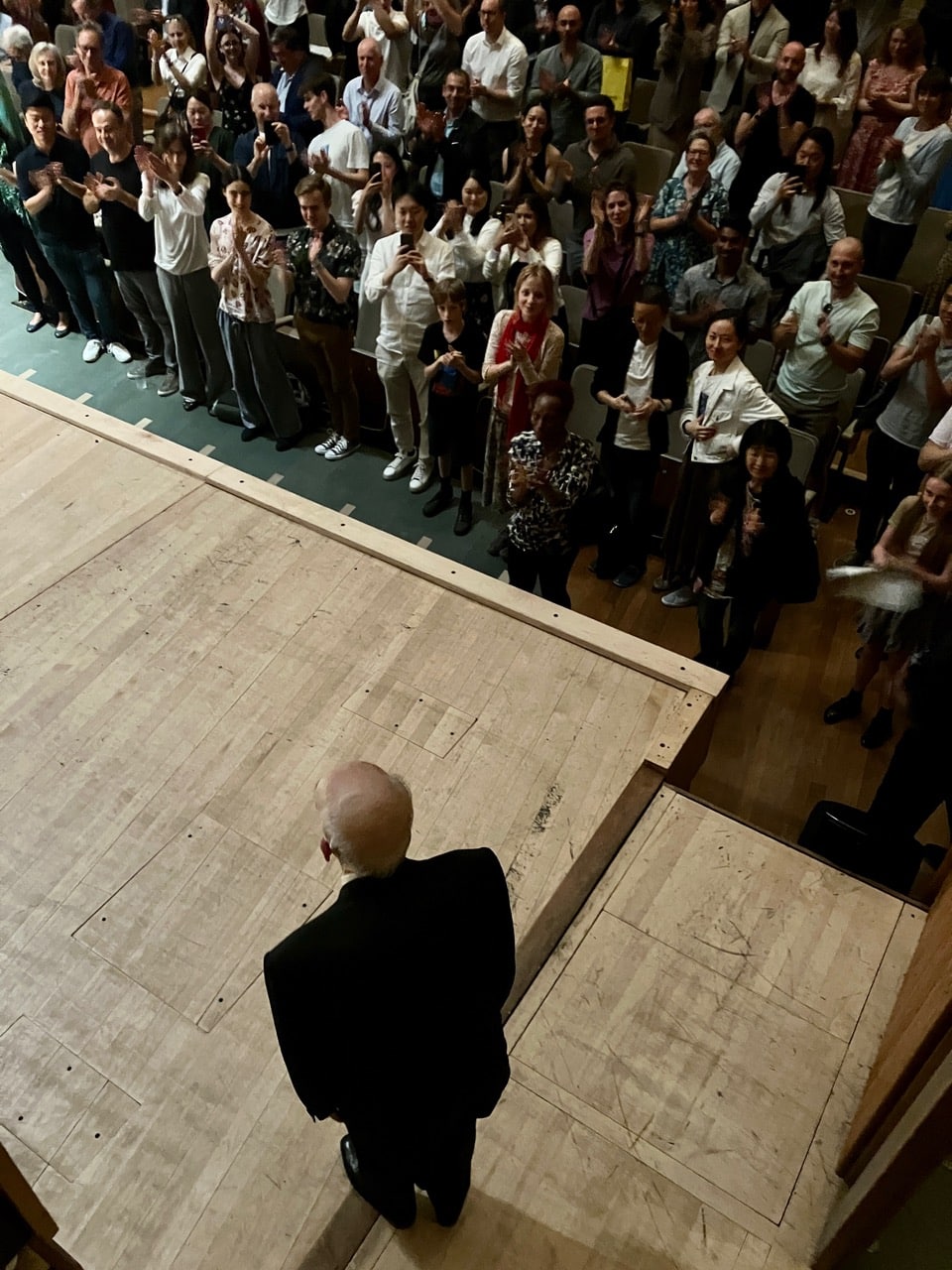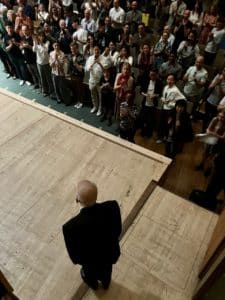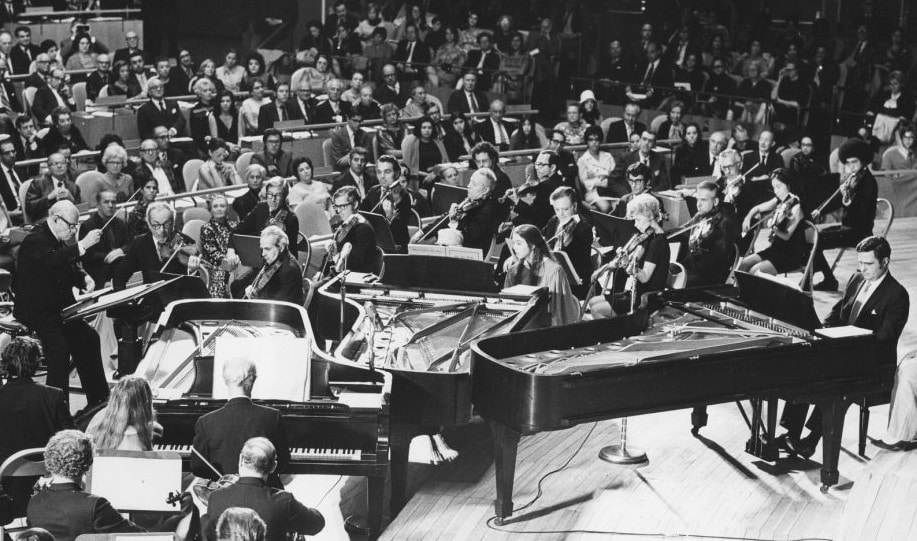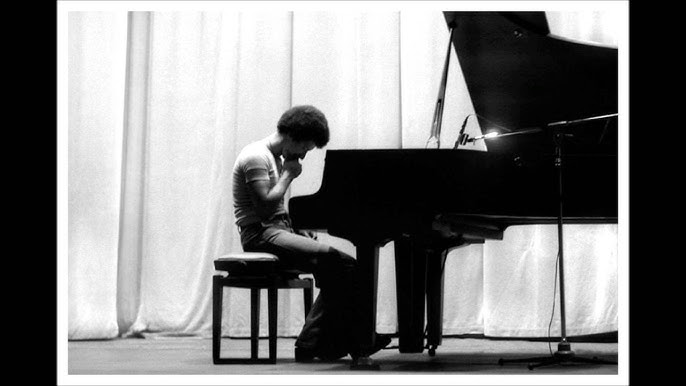No reviews for ailing Pollini
NewsIt appears that neither newspapers nor leading websites sent a critic to review Maurizio Pollini’s unfortunate return concert on Friday night at the Royal Festival Hall. Or, if they did, they have refrained from publishing.
One reader tells us: I was there, with friends and the applause was simply an adieu to one the world’s great pianists. It was obvious to everyone that he was utterly unequal to the task before him. That he was battling on desperately. That this was a tragic day for him. That he might never perform in London or likely, anywhere else again. It was an applause thanking him for more than six decades of incredible hard work and amazing music.
It was a respectful farewell.
Here’s a final shot.
UPDATE: Here’s another eyewitness account from former Independent on Sunday arts editor Michael Church.







Hello!!!
https://www.colinscolumn.com/maurizio-pollini-at-royal-festival-hall/
How wise was Alfred Brendel, who retired while still in his pick. Marry Perahia also stopped playing when he understood that his recurrent hand injury would not allow him a stable career.
John Lill also
What has happened to John Lill? Though we hadn’t seen his name for a while?
My understanding is that he has retired due to an injured back. He will be missed, I’m sure.
When announcing his retirement, Brendel (one of my all time musical heroes) said something like “The distance from brain to fingers is becoming too great”! Good that he left on a high and could joke about it, and we still have Brendel the published poet!
I imagine Brendel still plays wonderfully well. …but not in public.
I am reminded of the great Italian violinist Gioconda de Vito 1907-1994 who when young heard a one-time great pianist make a total hash and she swore never to let herself perform in that state. At the age of 54 she felt that she had reached the apex of her abilities “I can go no further” and thus closed her violin case ‘per sempre’. She is therefore remembered as a great violinist.
Hmmmm. Some performers would do well to take a leaf out of her book…..
Tasmin Little — another violinist who retired at the apex of her career.
de Vito’s approach to the inevitable issue is certainly commendable and sets a high standard, but — there has to be a “but” — using her standards, when would Menuhin have retired? 1955? Perhaps even a decade earlier? And what of Gitlis? Are there not treasurable things in the Mischa Elman stereo recordings, and the last Kreisler 78s, even with much that has to be forgiven? The fires cooled for Kogan and Grumiaux, yet they were still estimable artists with much to offer. Oistrakh was past his prime when he made his Mozart Concerto recordings for EMI but would we want to be without them? Having something to offer that is of value and is treasurable is another test, another alternative to the de Vito (or Rosa Ponselle for that matter) cold turkey decision. But it comes at a sad cost — the final appearances when the artist no longer makes the decision, it is made for them.
also Heifetz retired in his 70s
It’s standard practice (commendably so) that if a reviewer can in good conscience only write a bad review for an artist whose performance they normally respect, they will not submit a review for the concert which they have attended.
Renata Tebaldi retired in her prime at 54; if a fatigue was in her voice, probably only her could hear it. But she wanted to be remembered as perfect. I remember the old lady taking a seat to listen to a concert (it was 1995 or so, she had retired since twenty years) and being give a four minutes applause by the public.
Tebaldi was, apparently, very keen to retire. She didn’t want to go on past her best.
I was there too! It was at the Met and she was in NYC giving master classes at Julliard.
I was at Tebaldi’s last Met performances, as Alice Ford in April 1972 (in which she could hide in the ensembles) and one of three extremely painful shows as Desdemona in January 1973 (with McCracken and Milnes). The least said about them the better. While I knew she always had a “short top” I couldn’t believe she was only 50 (born 01 February 1922).
Those critics should do their job and report what happened, as you are doing here now. Because like Barenboim and Domingo, Pollini not only is making a fool of himself in front of all of us adoring fans. Also because coming from them, it shows lack of respect for their own artistic carrears, music and the admiring public. Critic’s are making those great artists great damage not reporting what’s going on. But critic’s are a endangered species in this political correct world we live in.
Horse manure. Why shouldn’t he play on until it all gets too much? Six decades of brilliance destroyed by one bad performance? Get a grip.
He played a brilliant Mozart 27 last October in Florence, repeating the second and third movements. People with far more knowledge than me beside me thought it superb. I did too.
Let the man alone. It may have been a bad night. It may have been the end. But the notion that this is somehow a comment on his character or indeed his career is risible.
Yes, yes, yes! Brilliant response . Enough of this perfectionism. Let him live and play out every last note. There is no shame at drinking life to the lees!
I beg to disagree. They say, oh, if you don’t like this particularly nasty piece of Regie opera, or this almost-tenor-gone-almost-baritone, or this amnesic pianist, don’t go. But this only works if there is an infinite supply of opera houses, opera productions, concert opportunities. In real life, critics should help the audience, not just the buck bringing names. Aerate the room!
As is correct grammar, apparently…
On which post is that a comment? If Alan’s, what is the *in*correct grammar you allude to? “Than me” is pretty venial.
To S: the comments on grammar are always a bit mean, many people on this site make the effort to write in English, but it is not their mother tongue, sometimes not even their second language, so some indulgence would be welcome. Not everybody was born in Oxford!
I wonder: Why did friends and collaborators let him on stage? Or is he that imperious and stubborn?
So sad if people don’t get to jump off at the right time. Some do (as mentioned Brendel), some sadly don’t (Domingo comes to mind) and then there are few lucky ones who were spectacular all the way through (Alfredo Kraus for example). This is more apparent for singers and less for pianists but here it seems to be the case. Wishing him well.
Well, I think that the newspapers and leading websites have behaved decently.
What’s the point in insisting so heavily on that concert when Pollini gave us so much pleasure with thousands of brillant concerts?
Isn’t that a bit sadistic?
We shouldn’t forget that all of us will grow older some day (and most of us without having ever been as brillant as him).
It was an unfortunate occurrence. As far as we know, that’s all it was. It may indicate a fundamental and permanent breakdown of his cognitive capability in performance, or it may have been an aberration and it will never happen again, and he will continue to perform excellently, if not at the same exact executional level of his youth (nor should we expect that if we’re purchasing a ticket to hear an octogenarian). Making larger claims about what this “means” and that it is a “smear on his career” is not so much disrespectful as it is–as of now–not provable.
There is an element of celebrity worship in classical music, as there is in pop music, film, and theatre. That really is the only reason to continue to trot so many past-their-prime artists.
Pollini and others of his generation were exemplary pianists, but the world is full of excellent young and middle-aged pianists, both famous and not so famous. The fact that we don’t give them a greater chance is explained only by celebrity worship. (And, no, there is no dying art of phrasing, tone production, etc. that is possessed only by the older generation because it has been mysteriously forgotten by younger artists, despite the existence of over one-hundred years of recorded piano performance.) Composers are irreplaceable. Pianists are not.
This is absolutely spot on.
Not to mention Pollini’s fee could pay probably 10 pianists who actually are able to play the works they propose.
Pollini was a giant, one of the best, but it’s time to give others a chance.
For goodness sake, lighten up and let’s celebrate the man, what a great artist!
List your top three Pollini moments. Mine (out of dozens) are:
1. The first LP of his I bought: Mozart concertos 19 and 23 with Bohm and the VPO
2. The phenomenal Bartok Second Concerto with the CSO and Abbado on DG
3. A gripping Boulez Second Sonata in Paris in the 1980s.
Perhaps someone (preferably him) might find time to track down live recordings of some of the repertoire he played live but didn’t record, and release them (as Brendel did): the late Brahms piano pieces; maybe even some Stockhausen…
Never heard Pollini in performance, but his long-unreleased first recording of the Chopin Etudes is incredible.
Last year in the RFH – the Barcarole was incredibly good. Last year his technique was ailing, but his memory and interpretive powers were still at full strength.
He also played the heroic Polonaise, I doubt he ever played the octaves in the left hand more smoothly or accurately when he was in his twenties.
Tatiana Nikolayeva (who had a life-ending stroke on stage during a Shostakovich performance in November 1993) did a remarkably good job of playing from memory right up to the end. I have got one of her last live recordings (performing Bach’s Art of Fugue at the Sibelius Academy, Helsinki, on April 26 1993) in which she suffered two small memory lapses but covered them up without any real detriment to the flow of the music.
I will always choose Annie Fischer or Nikolayeva false notes over Lang Lang right ones… Don’t forget Horowitz had really bad times, because of médecine he took or didn’t take but he recovered and was great in his indian summer….
There are choices other than a) decayed megastar with a justifiable reputation and b) young megastar with a less justifiable reputation. There are plenty of pianists who don’t get booked at the RFH who could outplay Pollini in his current state.
Pollini: unequaled in Litz’ Sonata
French nightingale Natalie Dessay is retiring next year. Age 58
or modify the repertoire slightly. The final page of the Schumann Fantasia is terrifying even for a pianist at their prime. Tchaikovsky: ‘The Seasons’ might be a nice idea.
Final pages of the 2nd Movement .
Incidentally, Hans Zender did an incredibly imaginative orchestration / re-imagining of the Fantasia. I’d go out of my way to hear this live .
In NL’s talk on Beethoven, in Birmingham a month or two back, NL stated that Beethoven knew when to stop.
Good to learn from the master.
Whether or not Maurizio Pollini continues playing is something that only he can decide.
He has a special place in my own heart. When I was a lad of only thirteen, back in 1960, he won the Chopin Piano Competition; he was only five years older than I was! I had just begun my exploration of classical music. After his victory at the competition, Pollini recorded the Chopin E minor Piano Concerto with the Philharmonia Orchestra conducted by Kletzki. The record was broadcast on the radio shortly afterwards. Until then I’d heard only a few Chopin solo piano works and wondered what a whole concerto by him would be like – so I recorded the performance. I was absolutely mesmerised and bought the LP. The recording eventually found its way on to CD and I bought that too. It remains one of my most treasured performances on record. It’s so sad that he had an unfortunate experience at that concert and it remains to be seen whether or not it was just a one-off, but there’s no doubt that he is one of the finest pianists of his era and nothing can take that away from him. I wish him well and so should we all.
The critics, one hypothesizes, had the decency to refrain from publishing, but M. Church just couldn’t resist. Suggesting that “Pollini in his prime was arguably the greatest pianist” is gratuitous, flippant and sensationalist hyperbole, as if being called “one of the great pianists” or “one of the greatest pianists”, which Pollini truly is, would not have sufficed. M. Church goes on to suggest that Pollini should have relied on muscle memory to carry him through… One just hopes no aspiring musician will read or follow his recommendation, and will, instead, continue to use their ear, their mind, and their knowledge of the structure of a given work, to prevent memory fiascos, as they would have been instructed by any competent teacher.